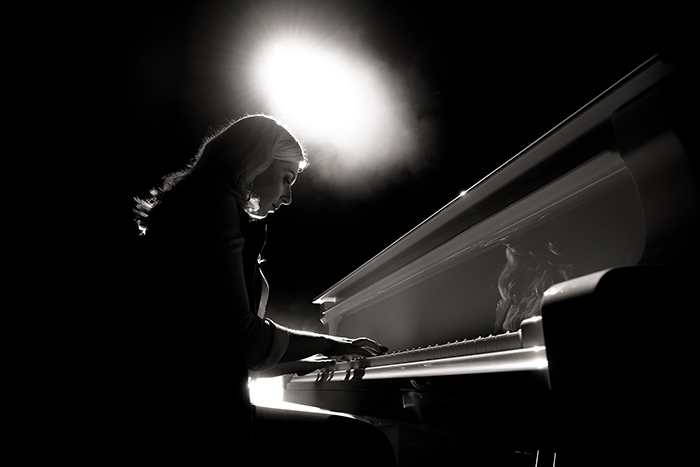I enjoy teaching adult amateur pianists for a variety of reasons, but the major one is that they have a passion and love for the instrument that I have rarely seen in professional pianists.
Professional pianists, of course, adore the piano; otherwise, they would not have chosen to spend their lives playing it, but the level of perfection necessary can sometimes turn the situation around.
To defend your title as a concert pianist, you must ensure that each performance is flawless and that each note is played in a precise manner to ensure the overall beauty of your interpretation. Technical and musical errors are not permitted. Everything has to be perfect, and the initial passion for the instrument can sometimes be replaced by a rivalry with ourselves and others.
The milieu in which professional pianists live is not always as pleasant as it appears. There is fierce competition among them because there is only room for a few, and every mistake could result in dismissal. During my studies, I witnessed several horrific events and met some really unpleasant people who would “murder” to win the prize. Particularly at international competitions.
I am not sure if you have ever been to one or if you have seen one on television. These international competitions are held so that hundreds of young pianists from around the world can participate. They are judged by many piano world personalities and win the competition if they are the most incredible pianist among their peers.
I have taken part in a handful because I had to, but it has never been a nice experience. There is far too much rivalry among the numerous competitors, and the enjoyment of music appears to have been relegated to the scrap heap.
It is a tragedy, but when you consider that thousands of young pianists perform at a similar level and that there is only space for approximately 10 of them, you can see why there is so much rivalry.
This intense strain also caused some exceptionally brilliant pianists to hurt themselves as a result of long hours of private practice. A professional pianist’s average practice time is 8 hours per day, although some spend up to 15 hours per day at the piano to guarantee that each piece of their repertoire is completely perfect. Remember, no mistakes are permitted!
This drive for perfection, I believe, is killing music and has resulted in a generation of pianists who do not communicate many feelings in their performances. Everything sounds antiseptic and dull. It was not always like this, however, as past generations of pianists had considerably greater leeway, which resulted in their being far more musical in their approach. Their performances did not have to be flawless. They weren’t always technically great, but they were always musically and emotionally beautiful. You will understand what I mean if you listen to some of the best pianists of all time, such as Arthur Rubinstein, Samson Francois, or Alfred Cortot. I also enjoy Dinu Lipatti, Heinrich Neuhaus, and Arthur Schnabel, although they are in a different group of pianists.
I have now gone into great length regarding the perfection that professional pianists must acquire in order to stay in the game, which may cause us to lose sight of our initial love for the piano.
Amateur pianists do not have this problem. They are not seeking for perfection and are aware that they will never reach it. They frequently have a demanding profession and do not have enough time to sit at the instrument perfecting every tiny detail or developing a rock-solid technique.
Because my parents both enjoy music, I am very familiar with amateur musicians. I understand exactly how they think and approach their particular instruments. Of course, they want to execute a piece to the best of their technical ability, and they work hard every day to better their performances. They do not want to make mistakes and want to perform to the best of their skills. What is most important to them is the happiness they get from performing some of their favorite works, as well as the pleasure they get from sharing their love of music with a private audience or other music aficionados.
What is most important to them is that they may share the beauty and deep meaning of a composition without having to include themselves in the equation. They are content to play Beethoven without ever considering that their performance will be more important than the beauty of the music they are performing.
Amateur musicians and pianists are not afraid to express themselves. They play only for their own amusement and have a great time doing it. They desire to succeed, but it never becomes an obsession. They are free to enjoy the music, which occasionally results in them performing more brilliantly than professional pianists.
Over the last two decades, I have met a number of extraordinary amateur pianists. They would be so enamored with the piano that I sometimes wonder if they should not start anew and reconsider their career. The majority of them have a similar background. They aspired to be musicians, but their parents had different plans….
Spending time with these amazing people on a weekly basis is tremendously inspiring and fulfilling! It appeals to me greatly since it allows us to concentrate on the interpretation and meaning of the music. It becomes perfect because it does not have to be flawless!
I used to be well-acquainted with Mrs Francois, the widow of the excellent pianist Samson Francois I mentioned before. Perfect performances, she used to say, are as boring as rain!
I could not agree more, and I believe that a pianist has attained excellence if he can depict the actual meaning of a work and share its emotions in a beautiful way.
Most of my piano students do, and I am quite pleased of them!











